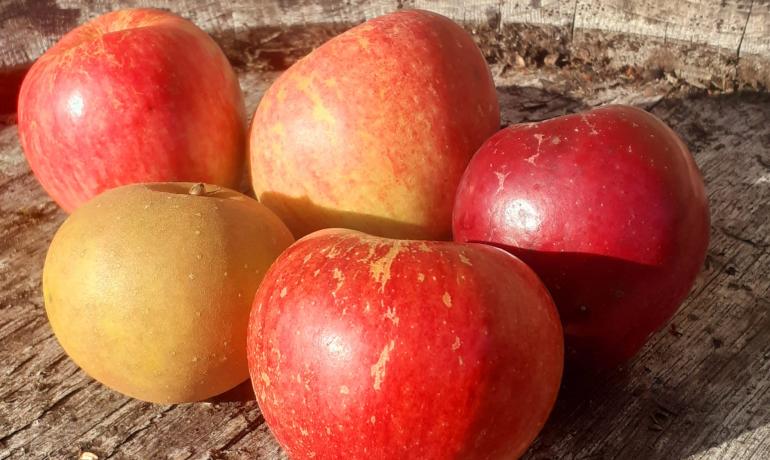
The Ampleforth Apple Festival will take place at Alban Roe House Visitor Centre from 26th October - 3rd November.
Ampleforth Abbey is home to the largest commercial apple orchard in the north of England, established by Fr Edmund Hatton in the 1940’s. Over 70 varieties of heritage apples are grown in the abbey orchard, many of which will never be seen on supermarket shelves such as Beauty of Bath, Ribston Pippin and Irish Peach.
To celebrate the long history of apple growing and cider-making at Ampleforth, this October will see the first Ampleforth Apple Festival take place.
Come and join in the fun with our celebration of all things apple, including demonstrations of traditional apple pressing (Tues & Thurs), children's craft activities, tasty treats in the Tea Room, an Autumn trail in the beautiful Abbey grounds, or win a medal competing in the awesome Apple Olympics!
Apple pressing demonstrations at Alban Roe House Visitor Centre:
-
Tuesday 29th October 11am
-
Thursday 31st October 11am
It’s fair to assume that the community of Benedictine Monks who settled here in 1802 have always had some provision of fresh apples. As the estate, school and the community grew, apples would have been the provision of fresh fruit for a good portion of the year.
Remnants of the first formal orchard can be found within our grounds– a Lord Derby which continues to bear fruit after well over a hundred years – and further evidence can be seen on the banks below the road to Ampleforth village, where a few dozen large, ‘standard’ trees still flourish.
However, it was Fr Edmund Hatton who planted the orchard as we know it today. Fr Edmund dedicated much of his time at Ampleforth from the late 1940s to establishing and tending to the trees.
As son of distinguished pomologist Sir Ronald Hatton, who himself was director of the East Malling Research Station in Kent, Fr. Edmund adopted the East Malling row system, whereby the trees are grafted onto dwarf rootstocks. Planted close together and kept low through pruning, the entire harvest could be picked easily and without ladders.
Such a system though relies heavily on manual labour, since all the trees must be picked by hand and require constant care. As the availability of fresh produce from elsewhere increased and the demand for apples waned, the monks found themselves with a glut of fruit (upwards of 30 tonnes in a good year).
It was sometime in the early 2000's that one member of the community had the idea to utilize the excess harvest by making cider. Initially a hobby, Ampleforth Abbey cider is now made by lay staff, supplying local farmshops, the Abbey Shop and Tea Room with our award-winning produce.


The orchard too continues to evolve.
Dwarf trees in a commercial setting are often grubbed-out and replanted on 12-year cycles, so it’s no surprise that our orchard was reaching the end of its life. We began to take out the most diseased and least productive trees to make way for new ones on a more vigorous rootstock and wider spacing.
We currently have over 70 different varieties in our orchard. Contrast this to a commercial orchard which may only grow a few in line with retail demand, and yet there are over 2000 in the National Apple Collection at Brogdale in Kent. Our replanting programme is a fantastic opportunity to showcase much more of our apple heritage. As well as broadening our product range and extending our season, this will also go a long way to futureproofing our orchard, ensuring there is a good harvest – and a good supply of cider - for many years to come.
Although not certified organic, we apply no chemicals to our orchard, preferring instead to manage it through careful husbandry, selective pruning, and by encouraging beneficial flora and fauna to flourish. In recent years we’ve witnessed this happening – small birds and mammals are now abundant, and where once the grass would have been close-mown and weeds sprayed off, it's now left to grow along with the meadow flowers that reside among it.
Ampleforth Abbey cider and apple juice is available in the Abbey Tea Room and Shop.


